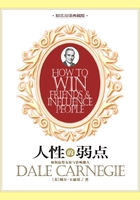
第19章 Ways to Make People Like You(8)
and there was a woman there who didn’t play bridge either. Shehad discovered that I had once been Lowell Thomas’ managerbefore he went on the radio and that I had traveled in Europe agreat deal while helping him prepare the illustrated travel talkshe was then delivering. So she said: “Oh, Mr. Carnegie, I do wantyou to tell me about all the wonderful places you have visited andthe sights you have seen.”
As we sat down on the sofa, she remarked that she and herhusband had recently returned from a trip to Africa. “Africa!” Iexclaimed. “How interesting! I’ve always wanted to see Africa,but I never got there except for a twenty-four-hour stay once inAlgiers. Tell me, did you visit the big-game country? Yes? Howfortunate. I envy you. Do tell me about Africa.”
That kept her talking for forty-five minutes. She never againasked me where I had been or what I had seen. She didn’t want tohear me talk about my travels. All she wanted was an interestedlistener, so she could expand her ego and tell about where shehad been.
Was she unusual? No. Many people are like that.
For example, I met a distinguished botanist at a dinner partygiven by a New York book publisher. I had never talked with abotanist before, and I found him fascinating. I literally sat on theedge of my chair and listened while he spoke of exotic plants and experiments in developing new forms of plant life and indoorgardens (and even told me astonishing facts about the humblepotato)。 I had a small indoor garden of my own—and he was goodenough to tell me how to solve some of my problems.
As I said, we were at a dinner party. There must have beena dozen other guests, but I violated all the canons of courtesy,ignored everyone else, and talked for hours to the botanist.
Midnight came, I said good night to everyone and departed.
The botanist then turned to our host and paid me severalflattering compliments. I was “most stimulating.” I was this andI was that, and he ended by saying I was a “most interestingconversationalist.”
An interesting conversationalist? Why, I had said hardlyanything at all. I couldn’t have said anything if I had wanted towithout changing the subject, for I didn’t know any more aboutbotany than I knew about the anatomy of a penguin. But I haddone this: I had listened intently. I had listened because I wasgenuinely interested. And he felt it. Naturally that pleased him.
That kind of listening is one of the highest compliments we canpay anyone.
What is the secret, the mystery, of a successful businessinterview? Well, according to former Harvard president CharlesW. Eliot, “There is no mystery about successful businessintercourse… Exclusive attention to the person who is speakingto you is very important. Nothing else is so flattering as that.”
Self-evident, isn’t it? You don’t have to study for four years inHarvard to discover that. Yet I know and you know departmentstore owners who will rent expensive space, buy their goodseconomically, dress their windows appealingly, spend thousandsof dollars in advertising and then hire clerks who haven’t thesense to be good listeners—clerks who interrupt customers,contradict them, irritate them, and all but drive them from thestore.
The chronic kicker, even the most violent critic, will frequentlysoften and be subdued in the presence of a patient, sympatheticlistener—a listener who will be silent while the irate fault-finderdilates like a king cobra and spews the poison out of his system.
The New York Telephone company discovered a few yearsago that it had to deal with one of the most vicious customerswho ever cursed a customer service representative. And he didcurse. He raved. He threatened to tear the phone out by its roots.
He refused to pay certain charges that he declared were false. Hewrote letters to the newspapers. He filed innumerable complaintswith the Public Service commission, and he started several suitsagainst the telephone company.
At last, one of the company’s most skillful “trouble-shooters”
was sent to interview this stormy petrel. This “trouble-shooter”
listened and let the cantankerous customer enjoy himself pouringout his tirade. The telephone representative listened and said “yes”
and sympathized with his grievance.
“He raved on and I listened for nearly three hours,” the“trouble-shooter” said as he related his experiences before one ofthe author’s classes. “Then I went back and listened some more. Iinterviewed him four times, and before the fourth visit was over Ihad become a charter member of an organization he was starting.
He called it the ‘telephone Subscribers’ Protective Association.’ Iam still a member of this organization, and, so far as I know, I’mthe only member in the world today besides Mr. —“I listened and sympathized with him on every point that hemade during these interviews. He had never had a telephonerepresentative talk with him that way before, and he becamealmost friendly. The point on which I went to see him was not even mentioned on the first visit, nor was it mentioned on thesecond or third, but upon the fourth interview, I closed the casecompletely, he paid all his bills in full, and for the first time inthe history of his difficulties with the telephone company hevoluntarily withdrew his complaints from the Public Servicecommission.”
Doubtless Mr. — had considered himself a holy crusader,defending the public rights against callous exploitation. But inreality, what he had really wanted was a feeling of importance. Hegot this feeling of importance at first by kicking and complaining.
But as soon as he got his feeling of importance from arepresentative of the company, his imagined grievances vanishedinto thin air.